How many pleasant evenings dining al fresco or hanging out with friends on the patio have been ruined for you by flying armies of hungry mosquitoes? People talk about the amazing powers of mosquito repellent plants, but the question is, do they really work? In this post, we’ll show you the best mosquito repellent plants and how to make your own DIY mosquito repellents from plants.
You know the saying if it sounds too good to be true, it probably isn’t. Is this the case with mosquito repellent plants?
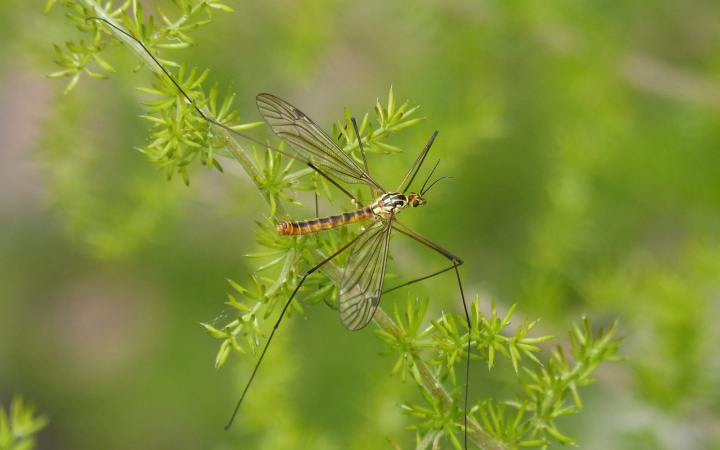
Well, yes and no—these plants do help somewhat, but to use their natural repelling powers simply planting them in your garden is usually not enough.
Let’s have a look at these plants and what you need to do to keep the pesky enemy at bay.
What Are Mosquito Repellent Plants?
Mosquito repellent plants work by emitting scents bugs find distasteful. Citronella, Lemon balm, Lavender, mint, catnip, citrosum, or basil are all said to be natural mosquito repellents.
The mosquito repellent chemical compound in many of these plants is citronella and there is scientific evidence to support this claim.
Some plants are more powerful than others, depending on the concentration of anti-mosquito compounds in their leaves and stems.
Do Mosquito Repellent Plants Really Work?
So, yes, certain plants emit scents that are offensive to these insufferable pests, but simply planting them in your garden is not a surefire way of making your evening outdoors mosquito-free.

The problem is that scent alone is not that powerful. To avail yourself of the benefits of these naturally occurring chemical compounds, you need to extract them and use them in lotions or bug repellent sprays.
Good to know: Most commercially available bug sprays do use these compounds, together with other not-so-natural chemicals you might not want to breathe in or have on your skin.
However, you can use the mosquito repellent plants in your garden to prepare your own, totally natural, bug lotion. More on this later on.
Are Mosquito Repellent Plants Safe for Dogs?
That’s a very important question as mosquitoes are dangerous for dogs because they spread the dreaded Heartworm disease, which can be fatal to your pet.
However, some plants touted for their mosquito repellent properties, like citronella, marigolds, and geraniums, are toxic for dogs, so they have no place in your garden.
Warning: If you have citronella in your garden, make sure it grows in an enclosed area your pet cannot reach. Also, do not use citronella-based products, commercial or homemade, on your furry friend.

What you can use safely is citrus juice. Simply squeeze some lemons, mix with water, and apply the liquid to the dog’s fur. Equally safe are products containing geranium or soybean essential oils.
Keep in mind that while geranium essential oil is safe for external use on dogs, the plant itself is toxic!
Fun Fact: Mosquitoes have been around since the dawn of time. The oldest specimen was found in Canada in a piece of amber that is 79 million years old!
Top Natural Mosquito Repellent Plants
Now let’s have a look at the plants that might make your garden and house an unpleasant environment for mosquitoes. And by implication, a much more pleasant one for you!
Java Citronella Grass (or Ceylon Citronella Grass)
You have to be careful as there are many varieties of citronella touted as the most effective mosquito repellent plant, but the description can be pretty deceptive.
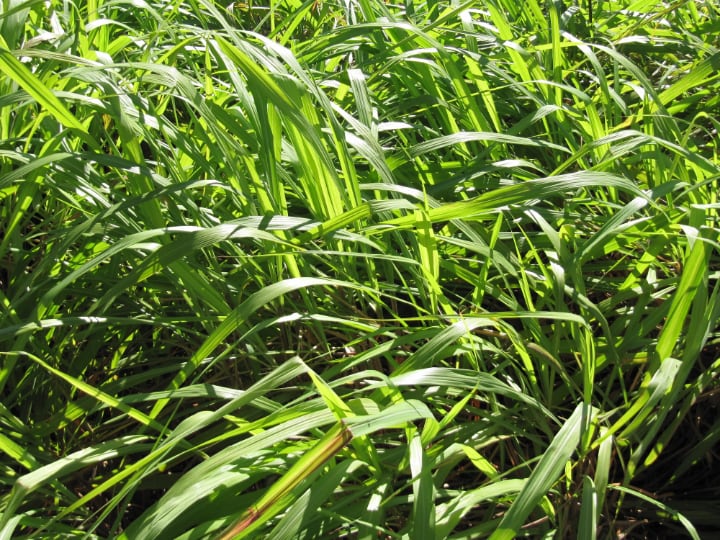
For instance, you might find in many stores a beautiful plant branded as the “mosquito plant“. Take a good look at it—if it looks like a geranium plant to you, that’s probably what it is, Pelargonium citrosum, not citronella.
What you should be looking for is Ceylon citronella grass or Java citronella grass. The name is a dead giveaway—it is a sort of grass and it should look like grass.
There’s a significant difference between these two types of plants.
Important: Pelargonium citrosum is a geranium variety with less than 1% citronellal content, while Ceylon citronella grass or Java citronella grass contain 14% and 21% citronellal, respectively.
Lemon Balm
Lemon balm is a member of the mint family and is very powerful against mosquitoes, as much as a plant can be.

It contains 38% citronellal so make sure to plant some in your garden!
Lavender
Many people have lavender in their gardens because they love the smell. Mosquitoes don’t. Nor do many other types of insects and even rabbits.
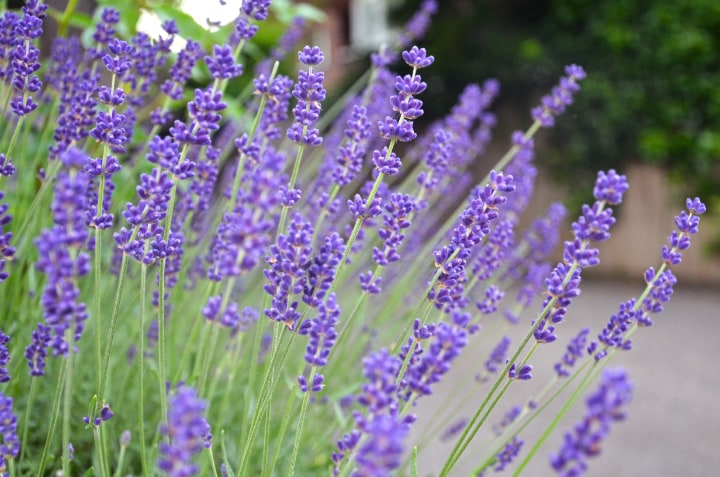
Catnip
This is sometimes called catmint as it is another member of the mint family. It contains an essential oil called nepetalactone.
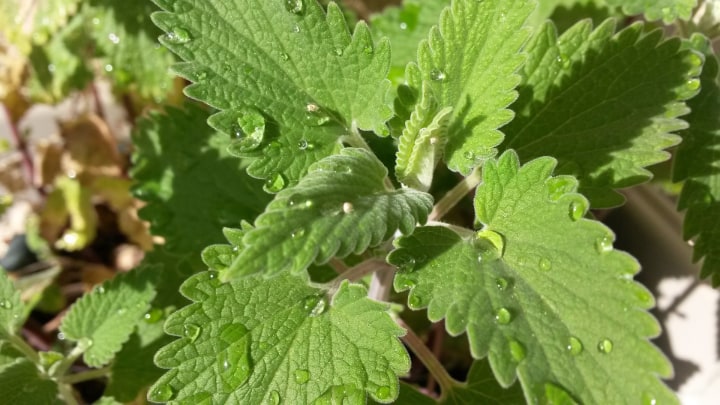
One study discovered that catnip is ten times more effective as a bug repellent than DEET, the main ingredient in most commercial sprays.
Marigolds
Marigolds have beautiful flowers, which makes them an excellent addition to any garden. But they are also one of the best-known mosquito repellent plants.
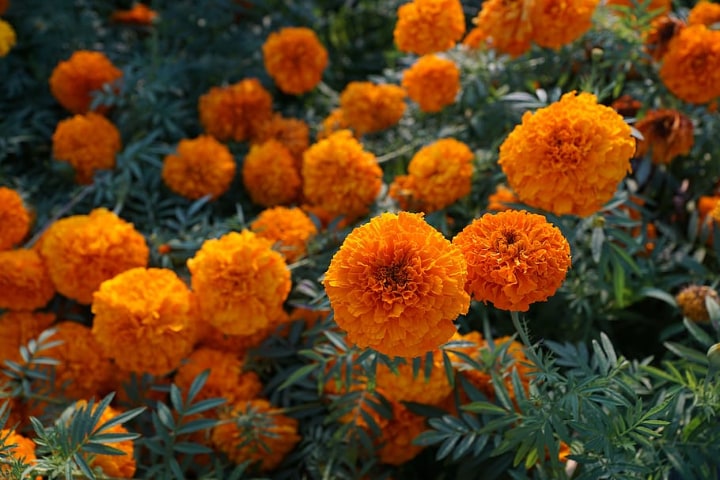
Mosquito Repellent Plants for Indoors
OK, maybe these mosquito repellent plants don’t keep all the mosquitoes away all the time, but they can at least help, especially if you live in an area where summer infestations are really severe.
And they’re very decorative plants, they smell nice, so why not have some around the house?
Lavender
Lavender is one of the best mosquito repellent plants that you can grow indoors. What you need is a good spot with plenty of sun and good airflow.
Important: Place your lavender pot on the windowsill or as close as possible to ensure optimum conditions. If the plant is well cared for, it can grow quite large so you might need to re-pot it.
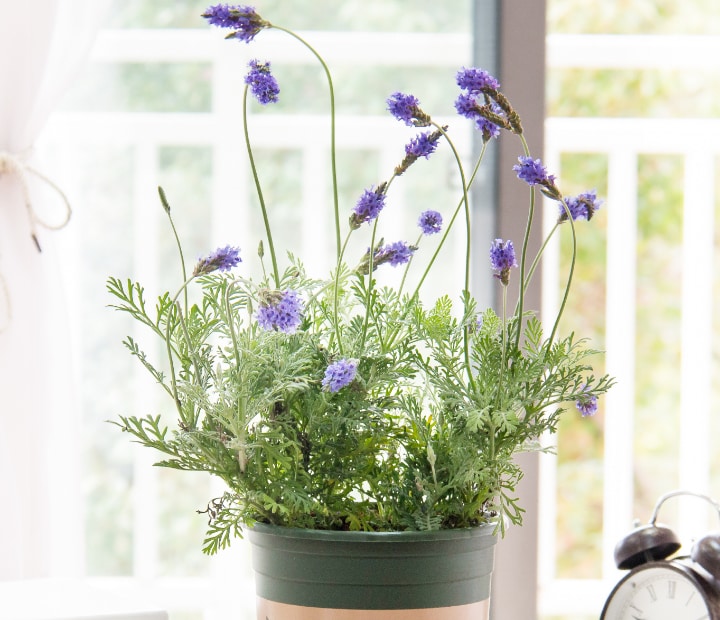
If the plant grows too big, split it and plant in several pots dotted around the house.
Keep in mind that English lavender has a stronger scent and is better as a mosquito repellent than the French variant.
Basil
This herb needs a lot of sun so it’s better to keep it on or near a window facing south. It’s easy to grow, doesn’t need a lot of space, but you must be careful with how much water you give it.
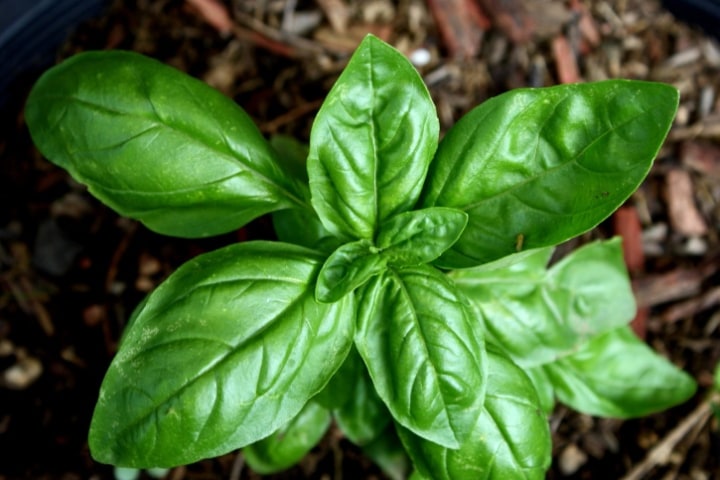
Use a well-draining soil for your pot. According to one study, basil essential oil is toxic to mosquito larvae, so this herb will help you make sure that your property doesn’t become a breeding ground for mosquitoes.
Lemon Balm
With its high level of the mosquito repellent citronellal, Lemon balm is a must. You can, of course, plant it in the garden, but it’s best to contain it in pots as it is very aggressive and might take over the whole garden.
A pot or two of lemon balm on the windowsill will offer good protection against mosquitoes if you like to sleep with your windows open.
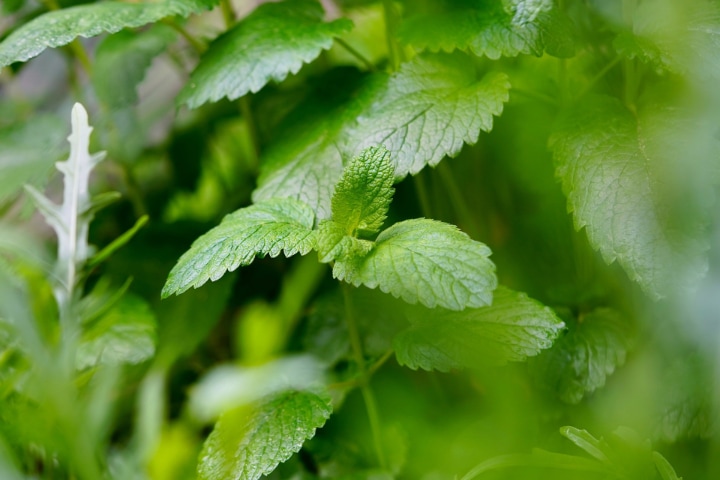
It does need a sunny spot but does not require as much sun as other mosquito repellent plants, like citronella or basil.
Tip: Don’t let your lemon balm plant go to seed as the leaves tend to lose their mosquito repelling properties once this happens. Nip the flowers in the bud.
Rosemary
It’s great to season many dishes with, but mosquitoes find it repulsive. Rosemary is a good choice if you have a small herb garden on your balcony.
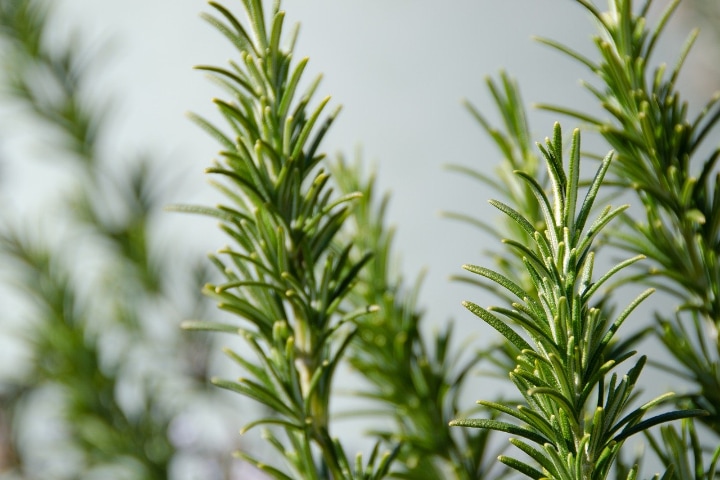
Tip: Rosemary needs a lot of sun and does well in dry conditions.
Mint
Mint is a hardy plant that needs full sun to partial shade to thrive. It produces tiny white, pink or purple flowers, but people usually cultivate mint for its leaves—quite refreshing in cold drinks or as a stomach-soothing tea.
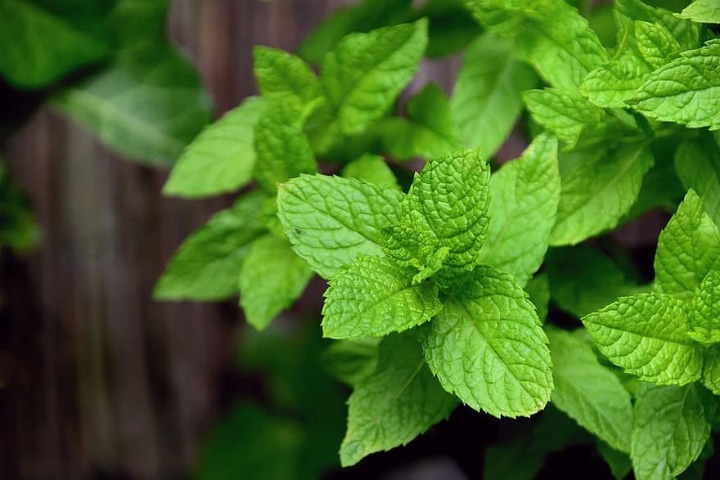
Most people find the smell of fresh mint particularly pleasing, but mosquitoes don’t!
Outdoor Mosquito Repellent Plants
If you like to spend a lot of time in your garden, especially in the evening when the flying pests tend to be most aggressive, make sure to plant as many mosquito repellent plants as possible.
Citronella Grass
Go for the real deal! Ceylon citronella grass or the Java variety is a must for your garden if you live in an area prone to mosquito infestations.
Both types grow in clumps and do particularly well in warmer climates, where they can be cultivated as perennial plants.
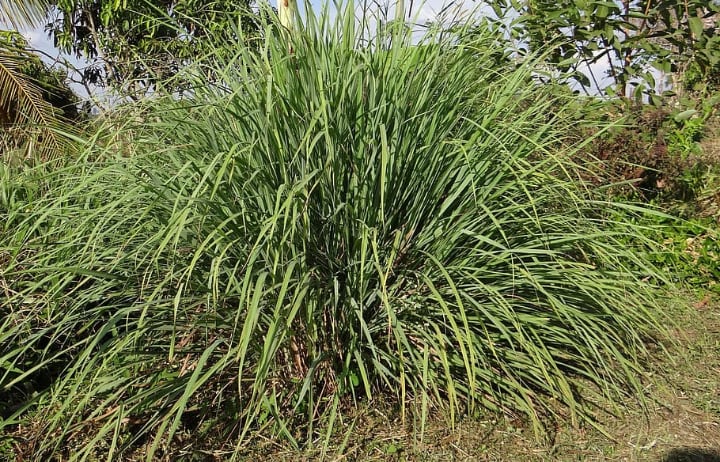
In other areas, you can grow citronella grass as an annual plant, as it will not resist the harsh cold in winter.
Citronella grass is very low maintenance and can grow up to 6 feet high. It can also be cultivated in pots placed around the patio if it has plenty of sun.
Pennyroyal
Pennyroyal is a natural mosquito repellent plant and looks lovely in any garden.
Plant some pennyroyal around the flower beds and they will create a wonderful atmosphere as its purple flowers are very attractive to butterflies. Not to mosquitoes, though.
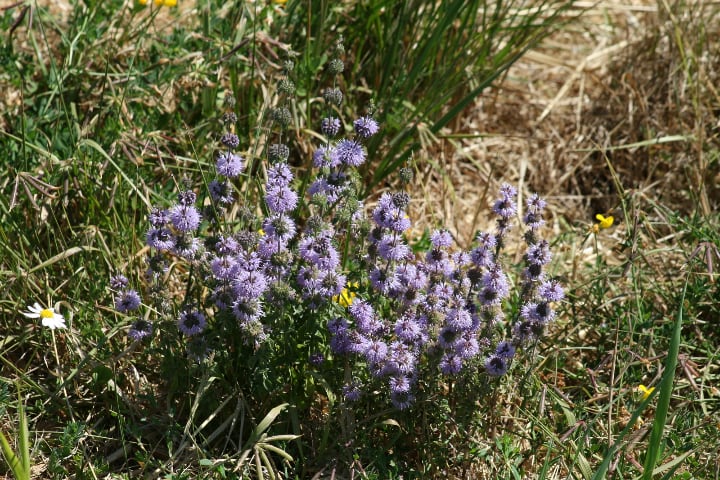
Tip: Don’t throw away dry leaves. Scatter them around the house to keep mosquitoes away.
Allium
Well, Allium is actually a species that includes hundreds of types of plants. Among them garlic and onions. If you have a vegetable garden, growing some garlic and onions will help keep mosquitoes away.
However, there are many other plants in the Allium family you might like to have in your garden, especially those that have beautiful purple, blue or pink flowers on long strong stems.
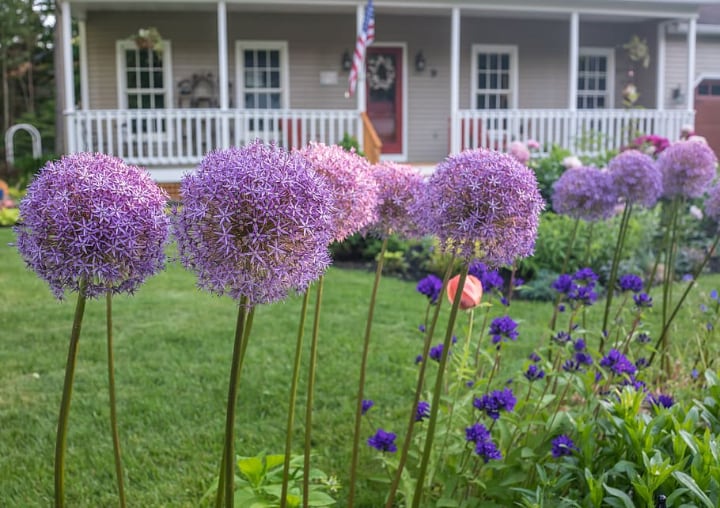
These are ornamental allium plants and look wonderful in a flower bed. And they don’t really smell of garlic or onions, but mosquitoes dislike the scent!
Pitcher Plant
This is not one of the mosquito repellent plants. On the contrary, the pitcher plant attracts mosquitoes and eats them!
You can cultivate this plant in pots and place them around your patio or on any sunny plot in your garden. It doesn’t need excessive sun though.
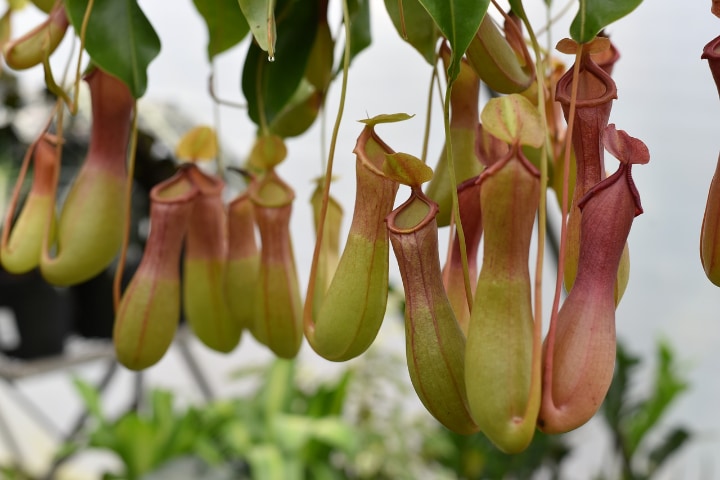
Good to know: Other carnivorous plants that are deadly for mosquitoes are drosera and Venus flytrap. Now, don’t expect these plants to devour swarms of mosquitoes as they only eat a few insects per week.
On the other hand, a pot with a pitcher plant or drosera kept inside your house might rid you of the odd mosquito that makes its way inside.
Floss Flower
These beautiful purple flowers contain coumarin, a natural bug repellent, so it’s a good addition to your mosquito repellent plants collection.
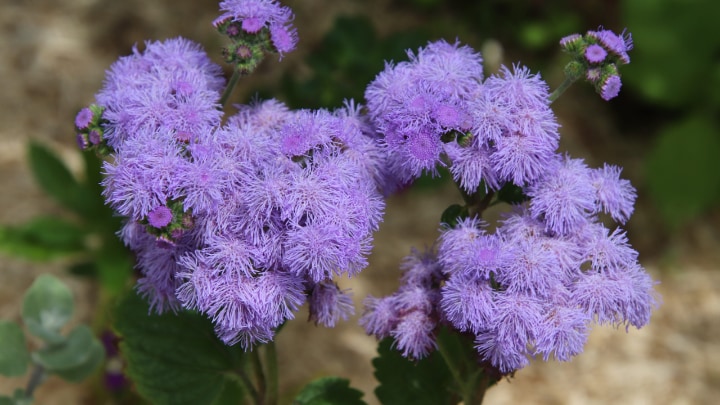
Warning: This plant is toxic when ingested, so be very careful with it if you have small children or pets.
Best DIY Plant-Based Mosquito Repellent Remedies
No matter how many mosquito repellent plants you have around the garden, there’s no guarantee they will make it mosquito-proof. Bug sprays and lotions work far better.
You can always make your own mosquito repellent, without any of the chemicals in commercial ones.
Don’t worry if you don’t have enough mosquito repellent plants in your garden to extract the essential oils you need or the skills to do it.
Using store-bought essential oils works just as well, only make sure they are of good quality.
Lemon Grass and Rosemary Essential Oil Lotion
A very easy recipe for an excellent mosquito repellent remedy.

Ingredients:
- 10 drops of rosemary essential oil
- 10 drops of lemongrass essential oil
- 2 oz of carrier oil (jojoba or coconut will work perfectly)
Instructions:
Mix the above ingredients and apply the resulting lotion on the exposed area of your skin at least twice a day.
Tip: You can also add 2 oz of water to make a spray, which is easier to apply.
Lavender Oil, Lemon Juice, and Vanilla Spray
A lovely scent to keep mosquitoes away—far more pleasing than commercial sprays and safer.
Ingredients:
- 10 drops of lavender oil
- 3 tablespoons of vanilla extract
- 3 tablespoons of lemon juice
- 1 or 2 cups of water
Instructions:
Mix everything together and pour the solution in a glass spray bottle. Apply liberally before heading out!
Dried Herbs Mosquito Repellent
If you don’t want to buy essential oils, you can use the dry leaves of the mosquito repellent plants in your garden to make an effective bug spray.
Ingredients:
Use any type of leaves you have: mint, basil, citronella, lemongrass, catnip, lavender, or rosemary. It is essential to have at least one herb of the mint family.
Instructions:
- Boil one cup of water and throw in 4 tablespoons of the above-mentioned dry leaves.
- Stir well and let it cool down, making sure to cover the pot to keep volatile oils in.
- Strain the mixture and mix in one cup of witch hazel or rubbing alcohol and pour the liquid in a spray container.
Instant Bug Repellent Candle
Another way of keeping mosquitoes at bay is by using scented candles, which you can easily make yourself.
This is the fastest way to get rid of mosquitoes. It’s super easy as you can use any sort of unscented candle.
Just light it and let it burn for a few minutes then put two drops of bug-repelling essential oils into the melted wax.
Warning: Be very careful as essential oils are highly flammable.
Place the candle on the table on the patio and you can enjoy a pleasant, mosquito-free evening in your garden.
Check the video below for a variation on this recipe:
Mosquito Repellent Plants FAQ: Gardeners Ask, We Answer
Now here are some of the most common questions we keep hearing about mosquito repellent plants. Find all the answers below!
Do mosquito repellent plants work?
Mosquito repellent plants like Java citronella grass, lemon balm, or lavender can drive mosquitos away but bear in mind that no plant is 100% efficient. Also, some plants advertised like mosquito plants like the common Citronella geranium Pelargonium citrosum don’t really work against mosquitos.
What plants are good to keep mosquitoes away?
The best plants to keep mosquitos away are Ceylon or Java citronella grass (not the common citronella geranium), lavender, catnip, lemon balm, and marigolds. Learn more about the best mosquito repellent plants.
What smell do mosquitoes hate the most?
Mosquitos seem to hate the smell of lavender, basil, peppermint, or certain types of citronella grass. Bear in mind though that many of these plants need to processed into essential oils for the scent to become a very effective mosquito repellant. Another option is to try DIY mosquito repellent remedies made from plants.
Does lemongrass really repel mosquitoes?
Lemongrass may repel a few mosquitoes, but it’s not among the most effective anti-mosquito plants. You’ll see better long-term results with Java or Ceylon citronella grass or lemon balm.
Mosquitoes, Be Gone!
Mosquitoes are one of mankind’s sneakiest enemies.
Join the fight against these super annoying pests by making your garden a place mosquitoes will hate the sight of. And smell, of course. Particularly the smell!
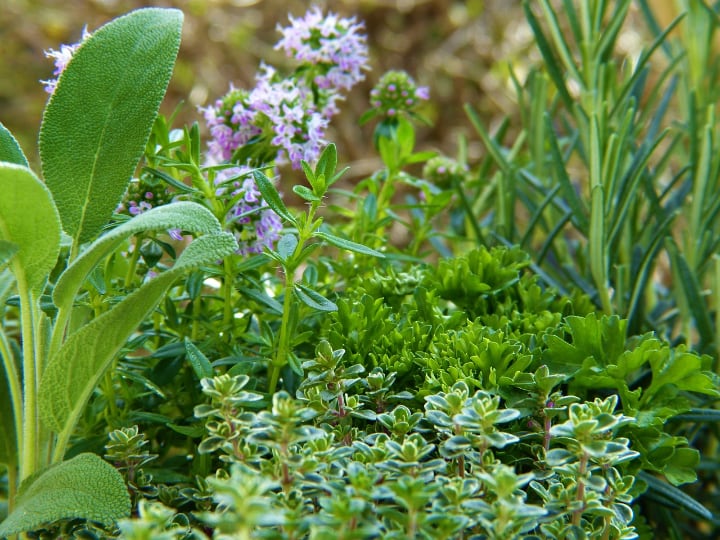
You, on the other hand, will have a pleasant evening in a garden that smells of lavender, mint, and lemongrass.
Nothing is 100% effective against pesky mosquitoes, but a man’s gotta try! Adding the right plants to your garden and using all-natural lotions, sprays, and candles will make you a much harder target for mosquitoes.
Once you try the plants and natural repellents we recommend, come back to us and tells us how it went. We’d love to hear from you. See you next post!

Leave a Reply